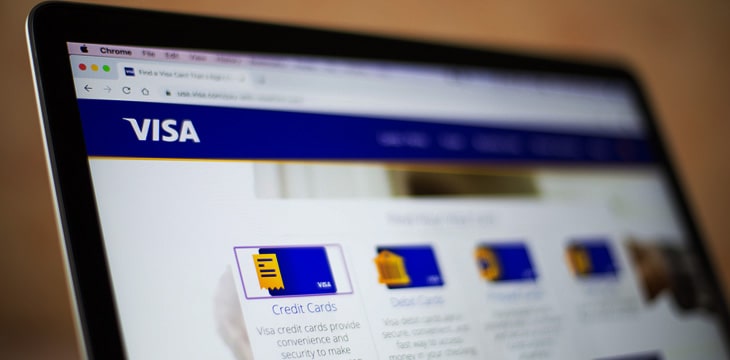|
Getting your Trinity Audio player ready...
|
Visa has filed a patent to create a digital currency that runs off of a “centralized computer.” In other words, Visa has filed a patent for a central bank digital currency. Visa originally filed the patent on November 8, 2019; however, the United States Patent and Trademark Office (USPTO), did not publish Visa’s patent until May 14, 2020.
Digitizing money to increase efficiency
In their filing, Visa notes that digital currencies have several benefits over physical money. According to the filing:
“Cryptocurrency systems have advantages over fiat currency systems. For example, cryptocurrency money transfers can also be faster than conventional fiat currency money transfers. Lastly, because some cryptocurrencies use blockchains, such cryptocurrencies are often trusted since blockchains are immutable records of transactions.”
Among the benefits, Visa mentions that digital currency payments can be sent, received, and settled faster than fiat transactions can. In addition, they note how transactions that are recorded to the blockchain are reliable because they are immutable and easy to audit.
How it works
At the top of Visa’s patent, it says “Digital Fiat Currency” and they provide a brief description of how they envision their digital fiat currency to work:
The central entity computer generates the digital currency for the denomination and linked to the serial number. The generating includes recording the digital currency on a blockchain. The central entity computer transmits a notification of the generation of the digital currency. The central entity computer causes removal of the physical currency from circulation in a fiat currency system.
At large, the system Visa envisions works similar to the fiat system that is in place today. However, Visa plans for a fraction of fiat currency to be removed from circulation and operate digitally. Visa’s patent indicates that they only want a portion of fiat currency to be digitized because they are aware that not everyone has the necessary electronic devices to completely digitize the economy.
“It is not practical for governments to wholly convert their fiat currency systems entirely to cryptocurrencies, since cryptocurrencies require the use of electronic devices. Some segment of the population of a country may not have electronic devices so a complete conversion of fiat currencies to cryptocurrencies is not practical,” says the filing.
In their patent, Visa states that it is not practical for governments to only use a digital currency system because it would require that everyone in the country has an electronic device—which we cannot assume is the case and therefore, makes a 100% digital economy impractical and even unfair.
The future of money
“This patent filing is evidence the private sector is very much at work on the future of money,” said J. Christopher Giancarlo, former chairman of the Commodity Futures Trading Commission and senior counsel at Willkie Farr and Gallagher.
We live in a world where electronic devices play a big role in our day to day lives. Many people don’t carry cash, and instead, make all of their payments via digital payment services or credit/debit card. As the global population spends more time using digital devices, it makes sense that the world innovates around their digital device usage, and creates solutions that fall in line with their digital lifestyles—including solutions related to money.
To learn more about central bank digital currencies and some of the design decisions that need to be considered when creating and launching it, read nChain’s CBDC playbook.

 03-05-2026
03-05-2026 




